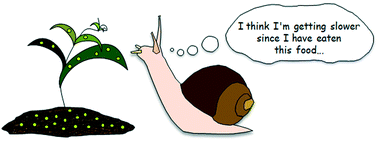当前位置:
X-MOL 学术
›
Environ. Sci.: Nano
›
论文详情
Our official English website, www.x-mol.net, welcomes your feedback! (Note: you will need to create a separate account there.)
Nanoplastic ingestion induces behavioral disorders in terrestrial snails: trophic transfer effects via vascular plants
Environmental Science: Nano ( IF 7.3 ) Pub Date : 2020/02/12 , DOI: 10.1039/c9en01335k Yooeun Chae 1, 2, 3, 4 , Youn-Joo An 1, 2, 3, 4
Environmental Science: Nano ( IF 7.3 ) Pub Date : 2020/02/12 , DOI: 10.1039/c9en01335k Yooeun Chae 1, 2, 3, 4 , Youn-Joo An 1, 2, 3, 4
Affiliation

|
This study investigated the transfer of plastic debris in a terrestrial environment from the soil to a plant (the mung bean, Vigna radiata), and then to a consumer (the African giant snail, Achatina fulica). Adverse effects of these plastic pollutants on the physiology of the plant and animal were investigated. The mung bean plants were directly exposed to nanoplastics (NPs) by adding NPs to the soil for 10 days. The snails were indirectly exposed by feeding them for 14 days the leaves of mung bean plants that had internalized NPs. We found that NPs decreased their root growth (82.9 and 83.3% of control growth at low and high concentrations, respectively) and led to particle accumulation in the leaves of the mung bean plants. Meanwhile, the growth rate (77.1 and 62.0% of the control rate at low and high concentrations, respectively) and feeding and foraging speeds (63.4 and 54.0% of control speeds at low and high concentrations, respectively) of the snails were decreased by dietary NP intake. This was associated with decreased gut microbiota viability and histological damage to the digestive organ tissues of the snails. Thus, NPs negatively affect the growth of plants and the animals that consume them in terrestrial ecosystems, which could have adverse effects at higher trophic levels.
中文翻译:

纳米塑料的摄入会引起陆地蜗牛的行为异常:通过维管植物的营养传递效应
这项研究调查了陆地环境中塑料碎片从土壤到植物(绿豆,Vigna radiata)再到消费者(非洲巨型蜗牛,Achatina fulica)的转移)。研究了这些塑料污染物对动植物生理的不利影响。通过向土壤中添加NP,将绿豆植物直接暴露于纳米塑料(NP)中。通过给蜗牛喂食已内化NP的绿豆植物的叶子14天,使蜗牛间接暴露。我们发现,NPs降低了它们的根生长(分别在低浓度和高浓度下分别为对照生长的82.9%和83.3%),并导致绿豆植物叶片中的颗粒堆积。同时,日粮降低了蜗牛的生长速度(低浓度和高浓度下分别为77.1和62.0%)和饲喂和觅食速度(低浓度和高浓度下分别为63.4和54.0%)。 NP摄入量。这与肠道微生物群的活力降低和对蜗牛的消化器官组织的组织学损害有关。因此,NP对陆地生态系统中消耗它们的植物和动物的生长产生负面影响,这在较高营养水平下可能产生不利影响。
更新日期:2020-03-21
中文翻译:

纳米塑料的摄入会引起陆地蜗牛的行为异常:通过维管植物的营养传递效应
这项研究调查了陆地环境中塑料碎片从土壤到植物(绿豆,Vigna radiata)再到消费者(非洲巨型蜗牛,Achatina fulica)的转移)。研究了这些塑料污染物对动植物生理的不利影响。通过向土壤中添加NP,将绿豆植物直接暴露于纳米塑料(NP)中。通过给蜗牛喂食已内化NP的绿豆植物的叶子14天,使蜗牛间接暴露。我们发现,NPs降低了它们的根生长(分别在低浓度和高浓度下分别为对照生长的82.9%和83.3%),并导致绿豆植物叶片中的颗粒堆积。同时,日粮降低了蜗牛的生长速度(低浓度和高浓度下分别为77.1和62.0%)和饲喂和觅食速度(低浓度和高浓度下分别为63.4和54.0%)。 NP摄入量。这与肠道微生物群的活力降低和对蜗牛的消化器官组织的组织学损害有关。因此,NP对陆地生态系统中消耗它们的植物和动物的生长产生负面影响,这在较高营养水平下可能产生不利影响。



























 京公网安备 11010802027423号
京公网安备 11010802027423号